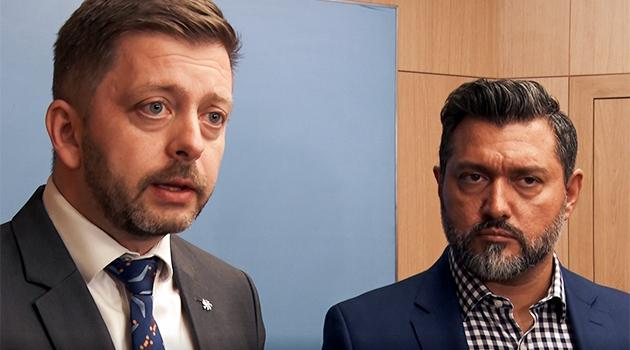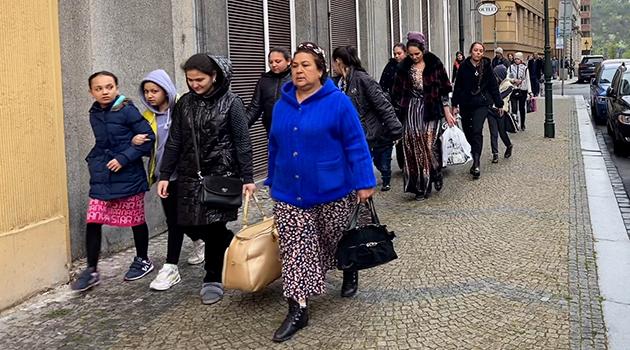Czech Interior Minister and Romani NGOs agree on closer collaboration to aid Romani refugees from Ukraine

Czech Deputy Prime Minister and Interior Minister Vít Rakušan (Mayors and Independents – STAN) has reached an agreement with representatives of some Romani organizations about their collaboration on aiding Romani refugees from Ukraine – such organizations are already assisting almost half of the Romani refugees from Ukraine in the Czech Republic and will also be helping in the busy regional centers for refugees from Ukraine in the future. Rakušan and the director of the Romodrom organization, Nikola Taragoš, jointly announced the agreement to journalists today.
Refugees from the Romani minority have usually been requesting accommodation with bigger capacities than are easily available in the Czech Republic. The Interior Minister said he wants such refugees to begin occupying facilities that are suitable within one week and will discuss this with Regional Governors tomorrow.
Last week, Rakušan said the authorities had chosen eight such properties for this potential use, and today he mentioned more than 20 in the selection. According to the agreement with the Romani organizations, a maximum of around 100 Romani refugees from Ukraine should find accommodation in each facility temporarily.
The presence of Romani NGO staff in the refugee centers for those fleeing Russia’s invasion of Ukraine is supposed to ensure better agreements will be reached with the Romani refugees, the Interior Minister said. “In busy centers, [Romani NGO workers] should aid us with the situation, providing quick information,” he explained.
“The newcomers will be informed by somebody whom they will understand and who will instill some level of trust in them,” Rakušan told journalists. According to him, Romani refugees often do not speak Ukrainian and also have requirements that are specific, especially their interest in large-capacity accommodation.
The minister said the authorities have found more than 20 buildings countrywide that could meet those requirements. It is important not to divide up families and to find them accommodation quickly, he added.
“We are consulting the chosen facilities with the Regional Governors, who will have another meeting tomorrow (Tuesday). I hope we will be able to generate agreement on their use,” the minister said.
“We want to hear from the local authorities that these facilities are satisfactory and that their use in this way will not be disputed,” Rakušan told the media. The buildings are state-owned and will need to be retrofitted to guarantee they will make decent housing.
“We want to have an agreement with the governors as soon as possible. During this week these buildings, most of which are currently not in use, can be put into such a state that we can get the first groups in there,” the minister said.
Representatives of Romani organizations will also work at those properties; Taragoš told reporters they will have to work on the integration of Romani refugees from Ukraine from the very beginning of their arrival into the country. “These facilities are just for a limited time, and then we will deal with the fact that they will move into more standard housing and how to achieve that,” the Romodrom director said.
According to the agreement with the Interior Minister, there should be a maximum of about 100 Romani refugees in each building, and they will then be prepared by NGO staff members to make a transition into accommodation on a smaller scale. A follow-up integration program should aid with that.
The NGOs expect there will be a program to pay for grant subsidies designed by the Interior Ministry and Labor and Social Affairs Ministry. So far, Romani organizations in the Czech Republic have been helping Romani refugees from Ukraine without receiving any financial assistance from the state since the beginning of Russia’s invasion of Ukraine.
Romodrom, for example, addressed their own lack of funds by taking out a loan. Since the beginning of the Russian invasion, the Czech Interior Ministry has issued 308 170 visas to refugees from Ukraine.
According to Taragoš, about 1 200 – 1 500 of those visa holders are members of the Romani minority, two-thirds of whom are children. So far, two-thirds of the Romani newcomers say they plan to return to Ukraine after the end of the war, but Taragoš considers that unrealistic given the destroyed infrastructure in Ukraine.
The Romodrom director anticipates two-thirds of the refugees will remain in the Czech Republic. He believes preparing Romani refugee children for school will be important in the near future, for example, by opening summer camps directly in the schools.
